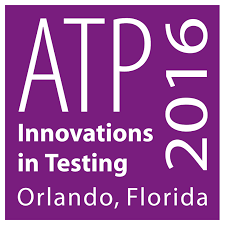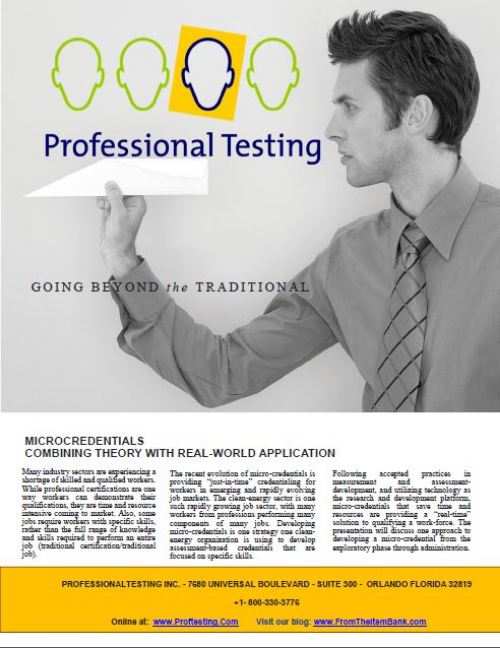Archives for Professional Testing
December 17, 2015 | Published by Professional Testing |
|
|
Professional Testing is thrilled to be presenting at several sessions at the upcoming Innovations in Testing conference, March 20–23, 2016, in Orlando.
|
September 9, 2015 | Published by Professional Testing |
|
|
Many industry sectors are experiencing a shortage of skilled and qualified workers. While professional certifications are one way workers can demonstrate their qualifications, they are time and resource intensive coming to market. Also, some jobs require workers with specific skills, rather than the full range of knowledge and skills required to perform an entire job (traditional certification/traditional job).
|
August 19, 2015 | Published by Professional Testing |
|
|
By: Roy Swift, Ph.D., Executive Director, Workcred - an affiliate of the American National Standards Institute (ANSI) Credentials hold the power to build education and career paths. But the last decade has seen enormous growth in the number and variety of labor market credentials – college degrees, educational certificates, industry certifications, occupational licenses, and micro-credentials such as badges. This growth has fueled confusion among students, workers, job seekers, and employers who are left to navigate the “credentialing maze” without a guiding compass.
|
May 27, 2015 | Published by Professional Testing |
|
|
The Census Bureau recently revealed that the 2050 tipping point, when the majority would become the minority and non-Hispanic whites would no longer account for more than 50% of U.S. inhabitants, may now occur as early as 2044. Yes, the landscape is shifting quickly and NOW is the time to make sure you’ve done your work to integrate multicultural marketing into your outreach efforts.
|
April 17, 2015 | Published by Professional Testing |
|
|
In March a livestreaming video platform by the name of Meerkat exploded at the South by Southwest (SXSW) festival in Austin, just two weeks after its initial launch. Shortly after Meerkat’s SXSW debut, Periscope, another live video streaming app recently acquired by Twitter, made a grab for the spotlight. As these new platforms for learning evolve we must ask ourselves, does livestreaming play a role in certification programs? We believe they can.
|
March 11, 2015 | Published by Professional Testing |
|
|
You have built your certification program from the ground up: from conducting market research to calculating the ROI of your program. You have identified experts to enhance the profile of your program and recruited customers to build a network of certificants. The next logical step forward is expanding your program. While traditional forms of marketing and advertising are necessary for program growth, no program can make it on its own. It is increasingly important for you to look to your certificants as ambassadors and equip them with the tools to bring recognition and credibility to your program. Helping your certificants market their certification also helps establish good will between you and the certificate holders and helps underscore their value in investing in this certification. It is a way that you can remind your certificants that they have made a commitment to their career and personal development by seeking out certification, that their new credentials are a representation of having achieved and exceeded industry standards for skill and knowledge, and that your program is here to support them.
|
February 4, 2015 | Published by Professional Testing |
|
|
The lifeblood of every credentialing body is its credential examinations. Although sometimes in addition to experience and education, credentialing exams... View Article
|
January 28, 2015 | Published by Professional Testing |
|
|
The most valuable assets of most certification organizations are intangible. The certification examination, and the credential itself, are the foundation... View Article
|
January 14, 2015 | Published by Professional Testing |
|
|
Today certification has become a buzzword in our society extending far beyond the familiar MD and CPA we instantly recognize as consumers. Over the last few decades, we have seen a proliferation of certifications develop across industries and professions ranging from IT security to automotive services. Many non-profits have led the way in developing voluntary certifications to promote industry standards, create avenues for career advancement for members and to demarcate those professionals who have gone the extra mile to distinguish themselves. In fact, non-profits occupy a special niche in the world of voluntary certification and in so doing have created a unique value proposition for their stakeholders—beginning as advocates of standards. After all, who better to set industry or professional standards than the members themselves?
|
January 7, 2015 | Published by Professional Testing |
|
|
Very few people desire credentials that have little or no value. Each credentialing organization faces unique challenges when defining the... View Article
|
|
|
|



